Stars Of Chaos 杀破狼
Stars of Chaos 杀破狼
Volume 3, Notes 5/5, Pages 358 - end

The "Imperial Censorate" here is 御史台, which is the department, not the person. Chang Geng would never slap another person in full view of the court; but he would not hesitate to admistratively slap another department if he felt it was justified.

So. The classic punishment for adultery was to be put in a pig cage and thrown into the river to drown. I don't know how I know this little bit of trivia, seeing as I was raised in the west and my only contact to Chinese culture was my very conservative Chinese mother; but I know this. Adulterers get drowned.

谋事在人,成事在天。 Plotting depends the person, success depends on the heavens. I just wanted you to know that it's symmetrical in Chinese, even though it doesn't translate that way.

The "tactlessly" here is a translation of 不长眼色, which I think could be explained better as "not reading the room" or "not taking hints."
It's not that Ge Chen is tactless so much as he is clueless to the tension between Gu Yun and Chang Geng.

In the online Chinese version that I read, the line is "Zixi! Don't go!" which explains why Chang Geng is reaching out to grab him in a panic -- he thinks Gu Yun is leaving him.

Page 382
Top: The Chinese here is "看看我说话!" which can be translated as either
-- "Look at me while I am talking to you," (though that feels weird) or -- "Look at me and speak - respond to me,"
...both of which are a little different from what is actually written in English. The "look at me when you speak" translation threw me for a second because Chang Geng isn't speaking and hasn't said anything for a while.
Bottom: Liangjiang is 两江 which is Two Rivers. (The north side and the south side of the river?)

This section is actually so pretty:
“天时地利、花前月下、水到渠成”
The perfect time (天时) and place (地利); in front of the flowers (花前) and under the moon (月下); when success is assured (where water flows (水到) a canal will inevitably form (渠成)).

Carriage Door. The carriage door opened, and out came Shen Yi. He had hitched a ride with Miss Chen so that he could leave his home unnoticed.
(When I read the English, I thought that the door was the courtyard door and got really confused.)
----
And that's it for Volume 3!
I love 杀破狼 <3
My DanMei Literary Adventure Masterpost
Stars of Chaos - All Notes Links
More Posts from Weishenmewwx and Others
Stars of Chaos 杀破狼
by Priest, translated by Seven Seas
Notes & Annotations List (by me)
I am truly impressed that Seven Seas had this translated. Major kudos to the translators. Maybe it’s just me and my not-advanced Chinese reading level, but I find the writing style of Stars/Priest-in-general to be extremely …. Juicy. Rich. Savory: if there is a 4-word phrase concisely describing something elaborately and with deep historical context, Priest will use that phrase. If Priest can refer to Character A in a manner that immediately conveys Character B's feelings and emotions about that Character A, she will use that reference style instead of any simple name or pronoun.
Sadly, none of those idioms or reference styles translate well into English.
For me, reading Priest in Chinese is like reading an epic story off a wall mural in an ancient temple, but add jewels and engravings and some filigree in precious metals, and maybe leave some imperial armor and weapons lying around to trip over while trying to decipher some crazy-long sentence punctuated only with commas, no periods or semicolons or even long dashes in sight. It's amazing, but sometimes exhausting, and especially exhausting if I finally puzzle my way through a truly difficult passage only to realize "Ah. Chang Geng is theorizing about the potential short vs long-term consequences of different types of monetary policy. Sarcastically."
Anyway, here are some notes. A few are literal translations that you would have gotten two sentences later; a few are of wordplay that I really enjoyed but which didn't survive translation. A fair number are translations that you could have looked up in the glossary, but, really, who wants to spend their time looking up "shifu" vs "shishu" for a minor unnamed character?
The more important notes are fun cultural references, and some really tricky translations that I tripped over so badly that I had to go back to the original and figure out how to explain in English.
(After reading Vol 2:) AND it looks like Priest edited and changed her work just a little bit for print translation, but I love her (pirated) online version so much that I really really want you to know what I read and how much I love it. So I added a few sentence back in.
Volume 1 (Volumes 2 and 3 and 4 below the cut)
Notes 1, pages 12 - 81
Notes 2, pages 86 - 146
Notes 3, pages 148 - 202
Notes 4, pages 203 - 245
Notes 5, pages 249 - 281
Notes 6, pages 288 - 414
Notes 7, pages 415 - end
Volume 2
Notes 1, pages 21 - 46
Notes 2, pages 48 - 62
Notes 3, pages 63 - 87
Notes 4, pages 90 - 144
Notes 5, pages 153 - 237
Notes 6, pages 263 - 333
Notes 7, pages 339 - 366
Notes 8, pages 370 - end
Volume 3
Notes 1, pages 1 - 84
Notes 2, pages 97 - 151
Notes 3, pages 152 - 265
Notes 4, pages 267 - 350
Notes 5, pages 358 - end
Volume 4
Only 24 notes for the entire book! All right here :)
Back to the Masterlist of all the books I'm making notes on.
Sha Po Lang 杀破狼 (Stars of Chaos) ch 12,
in which poor Shen Yi expresses how he really feels about working with Gu Yun:
他心道:“打从我上了姓顾的贼船那天开始,就没摊上过好事。”
He said in his heart / he thought: “Ever since the day I got on board that Gu’s pirate ship, nothing good has happened to me.”
(No, Gu Yun is not a pirate. He’s commander in chief of all the military forces in the nation. But Shen Yi consistently considers him to be a stinky pirate.)
I love how in Chinese there’s this construction, 姓顾的 “surnamed Gu,” which is wonderfully specific and concise and terribly derogatory. “That person is so terrible that it’s not even worth it to say his full name, much less any honorifics.”
An eye-opening article about Danmei Radio Dramas in China:
https://supchina.com/2021/11/04/the-wild-wonderful-queer-world-of-chinese-radio-dramas/
It’s good. Especially if you’ve experienced the absolute exquisite excellence that is the MDZS radio drama, you’ll enjoy reading it :)

Some quotes:
These societies recruited their own production staff and talent, who collaborated to produce radio dramas and release them online for free. These are known as “web dramas” (网配剧 wǎng pèijù), in contrast with the professionally-produced “commercial dramas” (商配剧 shāng pèijù) that came later. These creators spent time, labor, and often cash on recording equipment, studio time, music, and other services, and made no money from their productions. What they did was, as they like to say, “generate power out of love.”
Despite this move toward a more general taste, danmei remains the most popular genre in radio dramas. At the time of this writing, danmei seasons account for 19 of the top 20 most-followed list on MissEvan. ….Topping the most-played list is The Founder of Diabolism (魔道祖师 módào zǔshī), with each season exceeding 100 million plays.…. Even on Ximalaya — which has a much broader audience than MissEvan’s younger, more female-dominant audience to whom danmei content most appeals — six of the 10 most popular radio dramas are of the danmei genre.
Sometimes the standard can seem arbitrary. “Take kissing for instance,” she says, “some may think eight seconds is okay and let you pass, but some others may think five seconds is too long and must be reduced to four seconds.”
Zhou Shen Song Obsession of the week: 无问 No Matter.
Apparently this is a song written (lyrics) by oft-collaborator Mao Buyi for the movie 无问西东 Forever Young, starring Zhang Ziyi, Wang Leehom, and other people I should probably know but don’t. The movie looks beautiful, but it doesn’t look like it’s bursting with happiness, so…
Zhou Shen sang 无问 for Singer 2020 in one of their Quarantine Sessions (I think), against a plain white wall, wearing an oversized jacket that looked like it could slip off any moment; his hair was tousled and his eyes looked puffy and no one had touched up his eyebrows — he looked exactly like how a lover is supposed to look after a long night of sharing heartfelt feelings. He starts in a whisper that hooks into your heart like the scent of jasmine in the dark before morning, and then the song and his voice build into a spectacular dawn, then settle once more into the most intimate whisper imaginable. I can’t linguistically express how this song makes me feel, except Loved.
https://youtu.be/9bWNHPuCxr8
I hope you like it, too.
Lyrics have been translated, if you’d like to read.

I feel like I am under attack here...he certainly killed me...no question
hey there!! hoping to get your input on this: ive seen plenty of fics where characters across the cql board will say just very openly "i love you." i don't know if this is a common way of expressing romantic love in ancient china? i could be wrong, but the FEELING i get is that it's more common to use gestures, or allude metaphorically to some poem/story instead of being so direct? i think theres an old-fashioned jpn phrase like "i'll make soup for u every day" to confess, anything similar here?
oof, so I’m going to go ahead and start by saying that I don’t know nearly enough to be make generalized statements about how romantic love is expressed in ancient/dynastic China or even in modern-day, because I’m just not widely-read/steeped in the culture enough. And even if I were, I still don’t know if I could make definitive statements on what can be considered a “common way of expressing love” because there are as many ways to express love as there are people and permutations of relationships on this planet.
The renditions of love that tend to linger in our minds, however, tend to be defined by action: 梁山伯与祝英台 Liang Shanbo and Zhu Yingtai, the butterfly lovers inseparable by death; 牛郎织女 Niu Lang and Zhi Nv, a mortal man and celestial maiden, crossing to each other over a bridge over the Milky Way made of magpies; 孟姜女 Meng Qiangnv breaking open the Great Wall with the force of her tears. Just gonna... put that out there.
I did include a brief discussion of the character 爱 ai in this post, which is the character that’s pretty much translates to ‘love’ (and many of its complicated English valences) in modern Mandarin. Given an earlier reading of 爱 not as ‘love,’ but as ‘begrudging, cherishing’ makes the possibility of saying 我爱你 woaini rather...unlikely in ancient China (especially when you consider that 我 wo and 你 ni were different pronouns back then, too... what I’m trying to say is that a simple ctext search hasn’t been helping me here).
I am, however, willing to bet that writing/reciting poetry for your lover was a Thing, and it wouldn’t be me if I didn’t seize every possible opportunity to add gratuitous poetry to a post:
《上邪》/ Shangye
上邪!/ High Heaven!
我欲与君相知,/ I want for us both to know each other
长命无绝衰。/ as long as life, with no decline or end
山无陵,江水为竭,/ When mountains lose their peaks, when river waters dry up,
冬雷震震,夏雨雪 ,/ when thunder rumbles in winter; when rain and snow fall in summer
天地合,乃敢与君绝!/ when sky and earth seal back together, only then will I dare end things with you!
One of the shortest pieces in the Hanyuefu, which I mentioned briefly in this post, 《上邪》 is an incredibly powerful declaration of love, loyalty, and devotion without using any of the above words (it does, however, use 知 zhi / knowing).
Oh! Both 《上邪》and《卜算子》use 君 jun, which you might recognize from ‘Hanguang-jun’ or ‘Zewu-jun.’ In addition to being an honorific, 君 also appears often in poetry as a respectful second-person pronoun. Again, it’s technically gender-neutral, though most of the time it’s assumed to refer to a man.
《卜算子》李之仪, Busuanzi by Li Zhiyi (Northern Song Dynasty)
我住长江头,君住长江尾。/ I live at the head of the Yangtze; you live at the tail of the Yangtze,
日日思君不见君,共饮长江水。/ Day after day, I think of you but do not see you; we drink from the same river’s waters
此水几时休,此恨何时已。/ When will these waters rest? When will these feelings stop?
只愿君心似我心,定不负相思意。/ I only hope that your heart is similar to mine; I would not let down the intent of our mutual love.*
*note: this entire last line is rough, but I spent more time than I’d like banging my head against 相思, which I translated as ‘mutual love.’ It’s glossed in Pleco as ‘pining, lovesickness’ but literally means ‘mutual thought.’
The language of thought, of mutual thought, of the sentiment behind the phrase thinking of you, is something that goes way, way back. It’s in 《饮马长城窟行》, from the poetry post I linked earlier; it’s also referenced in the last line of 《楚辞·山鬼》Mountain Ghost from the Songs of the South: 思公子兮徒离忧 / only in thinking of you can I depart from sorrows.
Oh! Here’s a classic declaration of love -- literally, from the 《诗经》 Shijing / Classic of Poetry:
[...]
执子之手,与子偕老 / I’ll hold your hand, and with you grow old...
[...]
It’s the most famous line from 《国风·邶风·击鼓》which I think is actually a... war poem? So a poem that’s primarily all about that Mutual Loyalty and Manly Camaraderie, but one that has had its most iconic line co-opted for the sheer romance of it all.
I’m not going to translate《击鼓》 fully because trying to read the 《诗经》is one of my personal nightmares, but you can find it here on ctext with the James Legge translation, which, admittedly, takes some liberties with the text.
One last poem, because the last line is peak pining:
《越人歌》 Yuerenge
今夕何夕兮 搴洲中流,/ What evening is this evening? Drifting in the river current.*
今日何日兮 得与王子同舟。/ What day is today? That I can travel in the same boat as you, prince
蒙羞被好兮 不訾诟耻,/ I hide my shyness, cover my fondness; there will be no slander or gossip or shame*
心几烦而不绝兮 得知王子。/ My heart is troubled, unending -- to come to know you, prince
山有木兮木有枝,心说君兮君不知。/ On mountains, there are trees; on trees, there are branches -- my heart delights in you, and you do not know.
*leaning heavily on the baidu-baike glosses
The story I’ve always been told about 《越人歌》 is that a prince of Chu, fleeing political strife in his state, crosses a river in a boat poled by a young woman of the state of Yue. She recognizes the fleeing prince and sings this song to him as she poles across the river. The catch is that she sings it in the language of the state of Yue, so he has absolutely no idea that she’s confessing her admiration and love for him.
This story, according to my Google searches, is inaccurate, but OH WELL, the last line is still peak pining regardless.
MDZS Volume 4 Annotations
Part 9, pages 293 - 309
Here begin The Edits.
My understanding, gleaned almost exclusively from reading tumblr, is that there are at least 3 versions of MDZS:
1) Original serialized story, published as it was written.
2) Cleaned-up story after the story was all done.
(I think this is the version that got published in Taiwan.)
3) Censored version, the only one that you can easily find online these days.
(This is the version that the ♥️Audio Drama♥️ is based on!)
While it’s awesome that Seven Seas didn’t censor MDZS, it’s also very sad that they didn’t incorporate all the sweet extra little scenes and adorable lines that MXTX added when she had to brutally cut out all the blatant physical intimacy (😢 that must have hurt 😢).
Here’s what to add back in, folks!

⭐️ 1)
WWX: “What do you want to do next?” He just barely restrained himself from saying “Whose house are you going to wreck next?”
LWJ furrowed his brow slightly and corrected WWX: “We.”
WWX: “Ok, ok. We.” (As in, “What will we do next, together.”)
LWJ nodded his head, and he even gave WWX the jujubes again. WWX wiped them on his clothes and took a few bites, thinking about how, in the middle of the night, Hanguang Jun wants Yiling Laozu to disturb the peace and make mischief with him.
If word of this got out, it would be disastrous.
Much more below the cut:

⭐️ 2)
After a moment, he tilted his head and asked, “How is it?”
WWX: “Hmm? What? How is it? … Good! Very good. I gladly bow down to your superiority!”
These were true statements. Even though he was drunk, Hanguang Jun’s handwriting was, as usual, exceedingly proper; WWX was ashamed at his own inferiority (re: handwriting) (handwriting is a big thing in Chinese culture).
LWJ nodded his head, and passed Bichen to WWX.
WWX: “…?…”
LWJ again tried to pass Bichen to him, and WWX accepted. He looked at the wall and noticed how there was a lot of space after the words “Lan Wangji,” then understood.
LWJ was waiting for him to write his own name up there!
LWJ stared at WWX unrelentingly, and WWX finally couldn’t take it anymore, saying “Ok, ok, ok. I’m writing. I’m writing.”
Resigned to this action (this fate), in the space after “Gusu LWJ,” he wrote “Yunmeng WWX.” Now, both of their names were side by side on the wall.
“Gusu LWJ, Yunmeng WWX, travelled here!”

⭐️ 3)
The sect rules of Gusu Lan were so strict, there was no way LWJ had ever had so much wild, crazy fun when he was little.

⭐️ 4) (an entire scene of Drunk LWJ exerting his dominance over a dog for the sake of WWX)
“Woof woof woof arf arf arf!”
Suddenly, an torrent of barking exploded like firecrackers in WWX’s ears. He screamed and instinctively jumped on top of LWJ: “Lan Zhan, save me!”
This household raised dogs?
In actuality, in the middle of this quiet night, WWX’s awful hollering and howling was much more terrifying than any dog’s barking. He was scared out of his wits, but LWJ’s expression did not change, and with one hand he held WWX and patted him soothingly, with the other hand he held his sword, then leapt lightly to the top of the wall; and from that position of superior height he looked down upon the wicked dog, and with a cold expression seemed to engage in a confrontation with it.
WWX had all 4 limbs wrapped around LWJ and his face buried in LWJ’s neck. His whole body was stiff, paralyzed. He screamed, “Don’t confront it! Go! Let’s go! Lan Zhan, get me away from here! Aughghghgh!!!”
While WWX was madly crying, the dog, upon seeing LWJ, had tucked its tail between its legs, extended its tongue, lowered its head, and was splayed on the ground crying; it didn’t dare bark anymore.
LWJ saw that he had achieved complete victory, then gently patted WWX twice more, held him tightly, then leapt down from the wall.
They had walked quite a ways away and didn’t hear a single bark; only then did WWX peel himself off of LWJ’s body. His eyes stared straight forward and his legs still trembled. LWJ patted his shoulder, expression focused on WWX as if asking if he was ok. WWX hadn’t fully calmed down yet, and with some effort took a deep breath, casually praising LWJ as he did so: “Hanguang Jun, you really are extraordinarily brave. Unparalleled!”
Hearing this, LWJ seemed to smile.
The moment was fleeting, and WWX thought that perhaps he was just seeing things. He was stunned.
A moment later, he sighed, rubbed his chin, and smiled. “Lan Zhan, now you know to regret not going to Lianhua Wu with me back then, right? Wait! Where are you going?! Don’t just run off!”

⭐️ 5)
WWX couldn’t help but tug on LWJ’s forehead ribbon. “You even order me around now?”

⭐️ 6)
WWX despaired. He gritted his teeth and pretended like everything was fine: “I’ll just help you pour over the bath water, ok? And the rest you can do yourself.” As he spoke, he made to dodge away from LWJ; suddenly, LWJ reached out and ripped off his sash.

⭐️ 7)
Seeing him this way, WWX’s heart inexplicably softened; he also felt it to be funny (Chinese doesn’t require subjects in sentences, so I’m not sure if WWX finds LWJ funny or the situation laughable or both). This person really has been this way since he was little — the things he wants, he would never say in words, but he would fiercely pursue with his actions. So, then, WWX dragged LWJ back to the tub, saying “Ok, I’ll help you bathe. Come here.” In his heart, he thought, “I’ve lost. I admit defeat. Ok, I’ll help him scrub a little — nothing more.”
⭐️ Alright!!
From here, pages 298 - 310, the edits were so many but also so subtle that I can’t just write them in. Instead, I highly highly recommend that you read the translation done by @boat-full-of-lotus-pods :
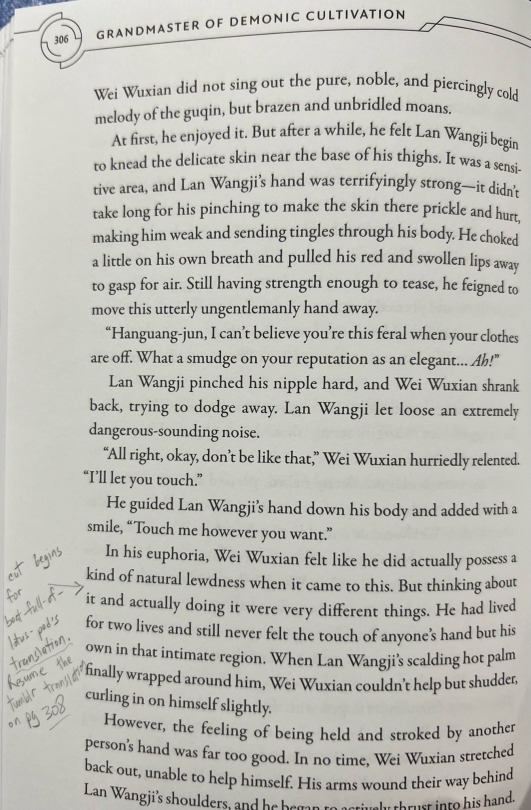


when i watch old movies i’m constantly surprised by how much acting has improved. not that the acting in the classics is bad, it’s just often kind of artificial? it’s acting-y. it’s like stage acting.
it took some decades for the arts of acting and filmmaking to catch up to the potential that was in movies all along; stuff like microexpressions and silences and eyes, oh man people are SO much better at acting with their eyes than they were in the 40′s, or even the 70′s.
the performances we take for granted in adventure movies and comedies now would’ve blown the critics’ socks off in the days of ‘casablanca’.
Ever see a depiction of St. George and the Dragon? It's pretty fair to say if you've seen one, you've seen them all: Georgie on a horse stabbing a flailing dragon creature, princess piously kneeling in the background, vague landscape alluding to the homeland of the artist's patron.
The most varied part is the dragons. No one had a real definition for the thing, it seemed. For your pleasure and entertainment, I have ranked some medieval depictions based on how impressive George's feat seems once you see the dragon.
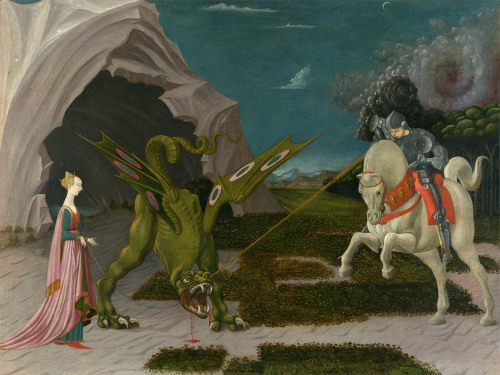
Paolo Uccello, 1456
This is a terrifying beast. The hell is that. Uccello was one of the first experimenters with perspective, so the thing also looks surreal, like it's taking place on Mars, or a Windows 95 screensaver. I would not want to fight that, I would not want to be tied to that. (Sometimes the princess is tied to the dragon for some reason.) 10/10
Horse thoughts: Maybe if I look at the ground it will be gone when I look up
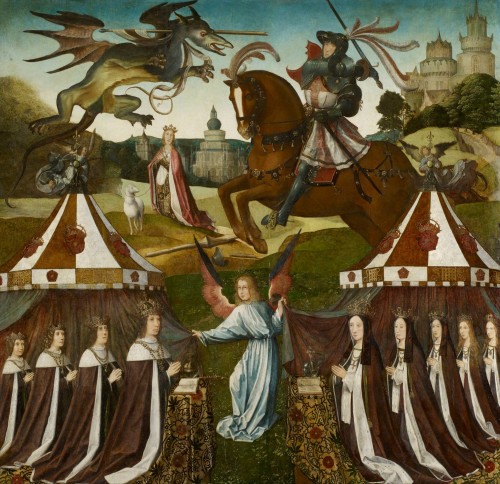
Unknown artist, c. 1505
This is a rare change of form for the dragon; it's the only one I've seen actually flying (or at least falling with style). It doesn't look particularly deterred by the spear through its throat, either. Also, George looks appropriately nervous. On the other hand, it hasn't got teeth, it seems to be fuzzy rather than having scaly armor, and George is bolstered by his army of Henry VII and his children, most of whom definitely didn't actually die in infancy. Still, wouldn't want to fight it, wouldn't want my pet sheep near it. (Sometimes the princess has a pet sheep for some reason.) 9/10
Horse thoughts: I am so glad I wore my mightiest feather helmet for this
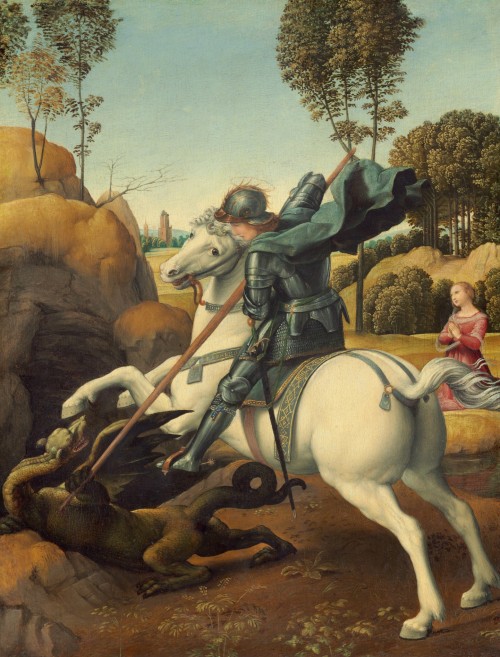
Raphael, 1505
We are coming to Dragons With Problems. This guy looks about comparable in size to George, and does have wings, but doesn't seem to be using these things to his advantage (and has he only got one wing?) And how does he deal with the neck? He does have a comically small head, but holding it up with such a twisty neck seems complicated at best. But most egregiously, he is doing the shitty superheroine pose where he is somehow simultaneously showcasing his chest and his butt, with its unnecessarily defined butthole (more on this later) (regrettably). 8/10 bc it's Raphael
Horse thoughts: AM I THE BESTEST BOI? AM I DOING SUCH A GOOD JOB? WE R DRAGON SLAYING BUDDIEZ
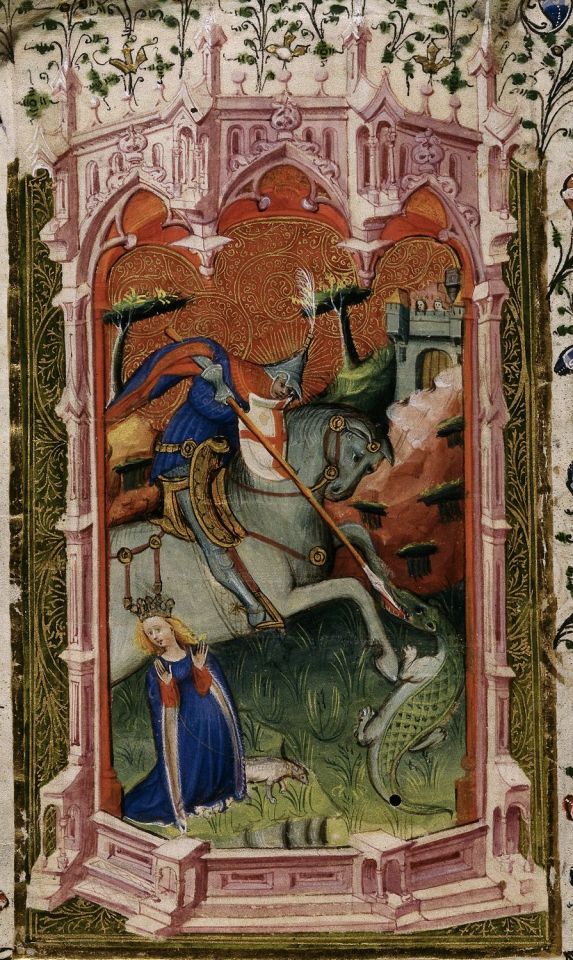
The Beauchamp Hours, c. 1401
We had a spirited debate about this one at work. Again, the dragon has gotten smaller, and this one hasn't got even one wing. He's basically a crocodile. So the debate became: would you want to fight a crocodile if you had a horse and a pointy stick? Would the horse trample the animal, who can't get on its hind legs, or freak out and throw its rider? Would the pointy stick be enough to pierce the croc's thick hide? In this case, George seems to be controlling his horse and putting his pointy stick in the dragon's weak spot, so we can be impressed by his skill and strategy. However, his hat is dumb. 7/10
Horse thoughts: Dehhhh
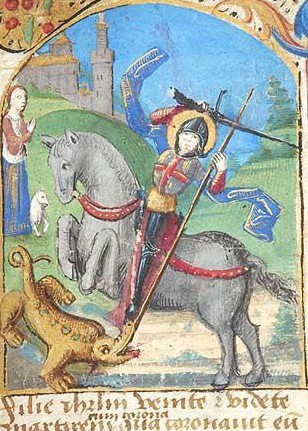
Book of Hours, c. 1480
Here we have the same kind of croco-dragon, but George's focus on his strategy has gone out the window. He's flailing around, not even looking at his target, he's about to lose his pointy stick, he hasn't got a hand on the reins, and his sword seems to only be poking the invisible dragon over his shoulder. All he's got going for him is that his hat is slightly less dumb. 6/10
Horse thoughts: Yay, new friend! Come play with me, new fr- what is happening
Final dragons put behind this Read More for your safety:

Rogier van der Weyden, c. 1432
I'm thinking this guy is at least semi-aquatic. Webbed feet, wings that seem more like fins, bipedal but top-heavy, jaws that seem more for scooping than biting. Maybe she's crawled up here from the nearby body of water to lay her eggs, and this is all a big misunderstanding. Moreover, George's dagged sleeves seem entirely impractical for the situation. 5/10
Horse thoughts: i got my hed stuk in a jar and now it is this way forever

Unknown artist, c. 15th century
I hate this. I hate everything about it. Why has it got human eyes and teeth. Why is its nose melting. Why has it got a dick on its face and balls under its chin. The fin/wings are back but they look even more useless. Also, George is shifty as hell, schlumped over in his saddle with his bowler hat thing over his eyes. The baby dragon at the bottom eating some hapless would-be rescuer is kind of metal. 4/10 at least the thing is gonna die
Horse thoughts: I Have Smoked So Much Crack

Book of Hours, c. 1450
Remember what I said about the buttholes? First, sorry. Second, yeah, we're back to that. I'll admit this one is less about the danger from the dragon itself than the very specific choices the artist has made. They didn't need to do that. It's a lizard. They don't even have. And it's like they had an orifice budget and they skipped an exit wound for the spear to focus. Elsewhere. It's so detailed. And George had an even dumber hat. 2/10 take it away
Horse thoughts: I Have Smoked So Much Weed
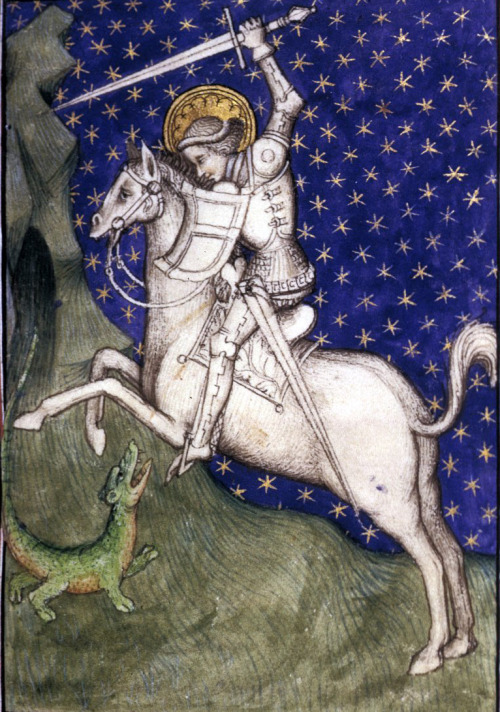
Book of Hours, c. 1415
This is just bullying. There isn't even a princess. That is clearly an infant. Look at that smug look on George's face as he swings his sword that's bigger than the whole little guy. This is the equivalent of when DJT Jr. hunted those sleeping endangered sheep. 1/10
Horse thoughts: ....yikes

And this is the previous one, but now the baby dragon is cute. He's chubby. He's got toe beans. He's Puff the Magic Dragon. His eyes have already gone white, implying that George is just kicking its corpse around for funsies. What's the difference between the dragon and the lamb in the background? That the dragon is dead, like our innocence. This George is truly deserving of the dumbest hat of all. 0/10 plus one more butthole for the road
Horse thoughts: Perhaps it is we who are the buttholes.
-
 lilyyv4 liked this · 5 months ago
lilyyv4 liked this · 5 months ago -
 iliadette liked this · 5 months ago
iliadette liked this · 5 months ago -
 strangerfromnextdoor liked this · 5 months ago
strangerfromnextdoor liked this · 5 months ago -
 neunshi liked this · 6 months ago
neunshi liked this · 6 months ago -
 weishenmewwx reblogged this · 6 months ago
weishenmewwx reblogged this · 6 months ago

